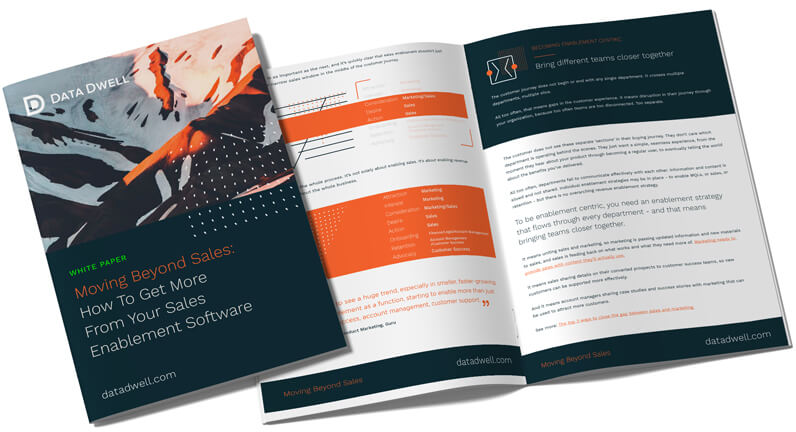
It’s not surprising that many of today’s salespeople are struggling to keep up with the competitive business landscape. While markets continue to change and buying habits evolve further, the bar set for sales keeps rising, putting increasing pressure on businesses to adapt and perform.
This is where sales enablement comes in.
In short, sales enablement refers to the systems your business puts in place to capitalise on existing leads and close more deals with those prospects. It’s critical for all businesses as it’s essentially the process that enables you to convert more leads into paying customers.
But whilst you probably know by now that sales enablement is essential for your business, you might not have a clear understanding of why. So here are 4 reasons why your business needs to adopt a sales enablement strategy, soon rather than later.
1. Sales Enablement builds core sales skills
As market and buyer behaviour has evolved, sales teams have adapted. In the process, many salespeople have forgotten what it takes to establish and maintain valuable communication with leads.
Sales enablement functions can be used to put an emphasis on effective sales onboarding, coaching and learning. Think pre-call plans, agendas, scripts, call execution, consultative skills and improvisation. These are the basic skills each person on the sales team should have before they can open communication with a potential buyer.
If sales teams can nurture these core skills, they will have the ability to lead valuable and meaningful conversations with contacts at each stage of the sales process. In turn, they are more likely to achieve the desired results.
Less is certainly more and stripping it all back, back to the basics, with the help of sales enablement tools and processes will ensure sales teams are practicing good selling.
2. Sales Enablement enables consistent collaborations
We know that when sales and marketing teams work in harmony, the business thrives. But figuring out the best way marketing can support the sales team is often just as much of a challenge as getting them to agree to work together in the first place.
The marketing team will undoubtedly have an incredible amount of valuable content, information and support to offer the sales team. They have a clear understanding of buyer personas and buyer behaviour. But teamed with the input from other teams like product management and legal, there is a high risk that it will all get a little bit too confusing.
In essence, they are all ‘enabling’ the sales team in their own way but it often isn’t managed effectively. It’s often focused on the wrong outcome too, with marketing producing content that attracts leads rather than converting them.
Sales enablement can support collaboration across multiple departments. For example, it can collect all of the assets from other teams and organise and deliver these to the sales team in an easy to understand way. And it can help marketing tailor their content for more effective use within the sales funnel.
Indeed sales enablement is there to benefit the sales force primarily, but it can and should impact everyone who interacts with buyers. Consistency in content, training, and information from the get go helps keep everyone on brand and on message.
3. Sales Enablement addresses changing buyer behaviours
Buyers expect sellers to be prepared, to be excellent communicators on all channels, and to have insights that solve their problems. It’s all part of the inbound marketing experience.
Sales teams can’t pitch to leads anymore. They have to continue nurturing them, mirroring the same experience they’ve had with the marketing department.
With sales enablement, salespeople have instant access to all of the information and knowledge from marketing, product management, sales ops, IT, legal, and research and development. It’s utilised as a collaborative discipline which equips people in customer-facing teams with everything they need to close a sale.
Used effectively, it can provide the right piece of content at the right time, perfectly angled towards the current behaviours and emotions of the buyer at that moment.
4. Maintain a strong, happy sales team
It’s no shock that sales turnover can be a real problem for businesses. Your sales force plays an integral part in the overall success of your organisation as they are ultimately the ones responsible for closing deals and bringing in revenue.
If your sales team is struggling to meet goals or close deals, because of the tools and processes you do or don’t have in place, it’s likely they are going to lose the confidence and motivation to perform. The more people you lose, the more time and resources you have to put into recruitment, onboarding and training.
Using sales enablement to help establish the foundation of good sales will ensure all of your sales force have a strong platform from which they can meet their targets. In turn, they will have more motivation to perform.
There you have it, four reasons why sales enablement is important for your business. Ultimately, each department in your business is going to have different goals, metrics, definitions and strategies. All of them valid, but each working in their own unique way.
For a business to succeed, it needs to synergise its departments and make collaboration and sharing easy and worthwhile for those involved. And this is where sales enablement comes into play.
Now you know why sales enablement is important, if you need help implementing it into your processes, we can help.




